|
 Reflecting on the Orientation and Six Ways to Enjoy Reflecting on the Orientation and Six Ways to Enjoy
a Happy, Successful Year! |
Casey Barnes
EPIK Teacher Trainer/ Kyunghee University
|
Another orientation has finished and almost a thousand teachers have been sent to their new homes and their new schools to have new experiences, new challenges, and to grow over the next year. It was certainly a pleasure for me to spend time with this marvelous group of individuals. Now, we can reflect on our experiences and consider the future of our EPIK lives. Below you will find some comments and suggestions from some of the EPIK Lecturers you met during orientation.
í░Having watched the demo classes from the two orientations, I was so pleased by the professionalism and dedication of the trainees. There were very creative ideas demonstrated, many of which I will be using in my own classroom.í▒ ~ Matthew Fennell, Hanyang University
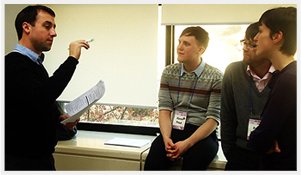 Matthewí»s point resounds strongly with much of what we talked about during the orientation. Planning and preparation are keys to success. I believe much of what made these lesson demonstrations some of the most successful we have seen was the dedication and commitment to preparing the best lesson possible. I hope that you carry that commitment into your schools and continue planning the best lessons you can so that our students can benefit the most from your presence.
Matthewí»s point resounds strongly with much of what we talked about during the orientation. Planning and preparation are keys to success. I believe much of what made these lesson demonstrations some of the most successful we have seen was the dedication and commitment to preparing the best lesson possible. I hope that you carry that commitment into your schools and continue planning the best lessons you can so that our students can benefit the most from your presence.
í░This was my first time being involved in an EPIK orientation as an observer. It was a real pleasure to meet the trainees, observe their ideas and lessons, and converse with the other orientation lecturers. Ití»s really energizing to be part of such a great team.í▒ ~ Ian Jones, SunChangHan University
I think Ian makes a wonderful point about being a teacher and continuing to grow. Finishing the orientation doesní»t mean being finished. There are many ways to continue to learn and develop as a teacher. Even for those of you who are not planning to become career teachers, it will make your stay in Korea much better if you get involved in some kind professional development opportunity. You can join KOTESOL and attend their workshops and conferences, you can start a Facebook community, or even just read a book about educational theory and practice. Also, when EPIK provides an online in-service training, think of it as a learning and development opportunity. There is always something one can glean from every professional development experience.
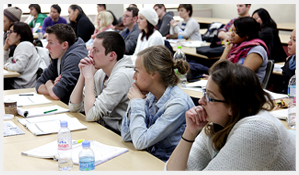 Also, surround yourself with other happy, successful teachers. It is easy to fall prey to negativity in any field, and much more so in education when teaching in a foreign country. Make a point to share something successful about your week with your colleagues and friends when you see them. Because just like our students, we like doing things we are good at, and if we remind ourselves of our successes then we can help to maintain a positive attitude about teaching.
Also, surround yourself with other happy, successful teachers. It is easy to fall prey to negativity in any field, and much more so in education when teaching in a foreign country. Make a point to share something successful about your week with your colleagues and friends when you see them. Because just like our students, we like doing things we are good at, and if we remind ourselves of our successes then we can help to maintain a positive attitude about teaching.
í░Students like doing things they are good at!í▒ ~ Casey Barnes, Kyunghee University
It is easy to see when students stop liking school. It is around the same time that they stop really producing anything tangible and start believing that they are í░not good at school.í▒ You can start the process of reversing this by planning activities that allow students to feel successful and í░good atí▒ school. These are often cooperative learning activities that follow an empathetic approach to education. Simple ways to start encouraging success in the whole class is to utilize activities that continue until all students have completed the activity.
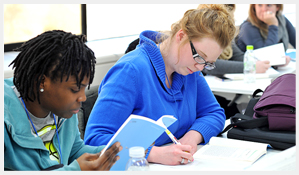 Students that finish early can be encouraged to check on their team mates to see if they need any help completing the í░mission.í▒ Additionally, when planning to elicit answers from students, prepare them. Being afraid of being called on is not a particularly empathetic approach to learning. But telling a group: í░Team 4, Ií»m going to ask you about question 1 in two minutes. Please be ready and have a speaker for your team,í▒ allows students to discuss their ideas, prepare a confident answer, and avoids that silent wait time while a student tries to think of an answer.
Students that finish early can be encouraged to check on their team mates to see if they need any help completing the í░mission.í▒ Additionally, when planning to elicit answers from students, prepare them. Being afraid of being called on is not a particularly empathetic approach to learning. But telling a group: í░Team 4, Ií»m going to ask you about question 1 in two minutes. Please be ready and have a speaker for your team,í▒ allows students to discuss their ideas, prepare a confident answer, and avoids that silent wait time while a student tries to think of an answer.
í░In the classroom maintaining a high level of motivation along with social interaction is extremely important to ensure language processing. Thus, a major goal in the classroom is creating this social atmosphere that facilitates discovery and honing of knowledge, skills, and ultimately, the attitude that helps it continue outside the classroom.í▒
Nick Mitchelmore, Hanyang University
I often think of myself less as a í░teacherí▒ and more as a í░facilitator.í▒ I encourage students, provide direction, but in the end they are working (in the classroom) much harder than I am. My work is usually not visible because it happens í░behind the scenesí▒ and outside of the classroom. But in the classroom students need to be working together creating something tangible, unique, and/or personalized. When students personalize language they also internalize language. When considering activities, please think about how many students are working for any activity. Bomb games, for example, although visually stimulating, often only involve one or two students actually speaking at any time. But team, cooperative learning activities can usually be conducted in a manner in which at least 25% of the class is working, producing language at any one time.
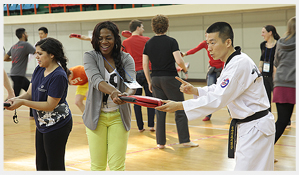 í░Doní»t break the kids.í▒ ~ Timothy Thompson, KAIST
Although a little blunt, Timí»s message is a pertinent one. We have a commitment to care for our students and a requirement to do no harm. I often reflect on the difference between these being í░our studentsí▒ but someone elseí»s í░children.í▒ We are carrying the most precious cargo imaginable. Of course, our students will challenge us. But letí»s not be reactive to our students, but rather proactive about classroom management, practicing empathy, and caring for all of our studentsí» well-being.
í░Doní»t break the kids.í▒ ~ Timothy Thompson, KAIST
Although a little blunt, Timí»s message is a pertinent one. We have a commitment to care for our students and a requirement to do no harm. I often reflect on the difference between these being í░our studentsí▒ but someone elseí»s í░children.í▒ We are carrying the most precious cargo imaginable. Of course, our students will challenge us. But letí»s not be reactive to our students, but rather proactive about classroom management, practicing empathy, and caring for all of our studentsí» well-being.
í░I am extremely delighted and reassured by the increasing quality of teachers that come to the EPIK program each year. I was most impressed by their passion, professionalism, and their desire to experience a different culture. My wish is that the new NETs will continue with the professionalism that they demonstrated during training. Additionally, I wish the NETs will continue to develop a healthy understanding of Korean culture, how we as NETs interact and impact the country as teachers, and residents of South Korea.í▒ ~ Daniel Moonasar, Gimcheon University, EPIK/TaLK Teacher Trainer
I think this is a marvelous thought to leave you all with. Good luck and I truly wish you all the best! Feel free to visit my blog for advice and ideas and feel free to email me anytime for any reason! I am always available for other teachers!
caseyengteacher@yahoo.com caseyengteacher.wordpress.com
All the best,
|
|
|
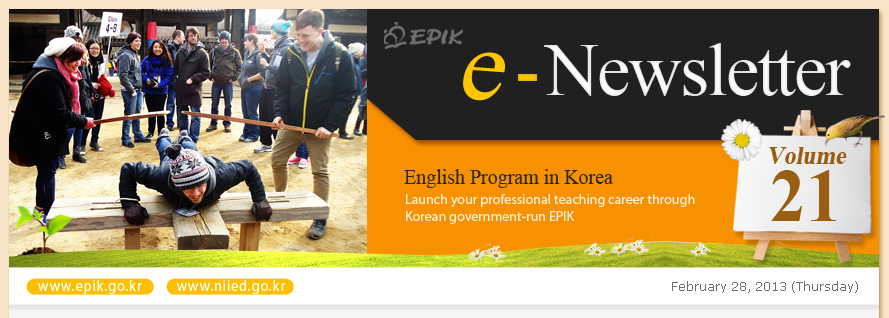



a Happy, Successful Year!
EPIK Teacher Trainer/ Kyunghee University
í░This was my first time being involved in an EPIK orientation as an observer. It was a real pleasure to meet the trainees, observe their ideas and lessons, and converse with the other orientation lecturers. Ití»s really energizing to be part of such a great team.í▒ ~ Ian Jones, SunChangHan University
I think Ian makes a wonderful point about being a teacher and continuing to grow. Finishing the orientation doesní»t mean being finished. There are many ways to continue to learn and develop as a teacher. Even for those of you who are not planning to become career teachers, it will make your stay in Korea much better if you get involved in some kind professional development opportunity. You can join KOTESOL and attend their workshops and conferences, you can start a Facebook community, or even just read a book about educational theory and practice. Also, when EPIK provides an online in-service training, think of it as a learning and development opportunity. There is always something one can glean from every professional development experience.
í░Students like doing things they are good at!í▒ ~ Casey Barnes, Kyunghee University It is easy to see when students stop liking school. It is around the same time that they stop really producing anything tangible and start believing that they are í░not good at school.í▒ You can start the process of reversing this by planning activities that allow students to feel successful and í░good atí▒ school. These are often cooperative learning activities that follow an empathetic approach to education. Simple ways to start encouraging success in the whole class is to utilize activities that continue until all students have completed the activity.
í░In the classroom maintaining a high level of motivation along with social interaction is extremely important to ensure language processing. Thus, a major goal in the classroom is creating this social atmosphere that facilitates discovery and honing of knowledge, skills, and ultimately, the attitude that helps it continue outside the classroom.í▒
Nick Mitchelmore, Hanyang University I often think of myself less as a í░teacherí▒ and more as a í░facilitator.í▒ I encourage students, provide direction, but in the end they are working (in the classroom) much harder than I am. My work is usually not visible because it happens í░behind the scenesí▒ and outside of the classroom. But in the classroom students need to be working together creating something tangible, unique, and/or personalized. When students personalize language they also internalize language. When considering activities, please think about how many students are working for any activity. Bomb games, for example, although visually stimulating, often only involve one or two students actually speaking at any time. But team, cooperative learning activities can usually be conducted in a manner in which at least 25% of the class is working, producing language at any one time.
í░I am extremely delighted and reassured by the increasing quality of teachers that come to the EPIK program each year. I was most impressed by their passion, professionalism, and their desire to experience a different culture. My wish is that the new NETs will continue with the professionalism that they demonstrated during training. Additionally, I wish the NETs will continue to develop a healthy understanding of Korean culture, how we as NETs interact and impact the country as teachers, and residents of South Korea.í▒ ~ Daniel Moonasar, Gimcheon University, EPIK/TaLK Teacher Trainer I think this is a marvelous thought to leave you all with. Good luck and I truly wish you all the best! Feel free to visit my blog for advice and ideas and feel free to email me anytime for any reason! I am always available for other teachers! caseyengteacher@yahoo.com caseyengteacher.wordpress.com All the best,